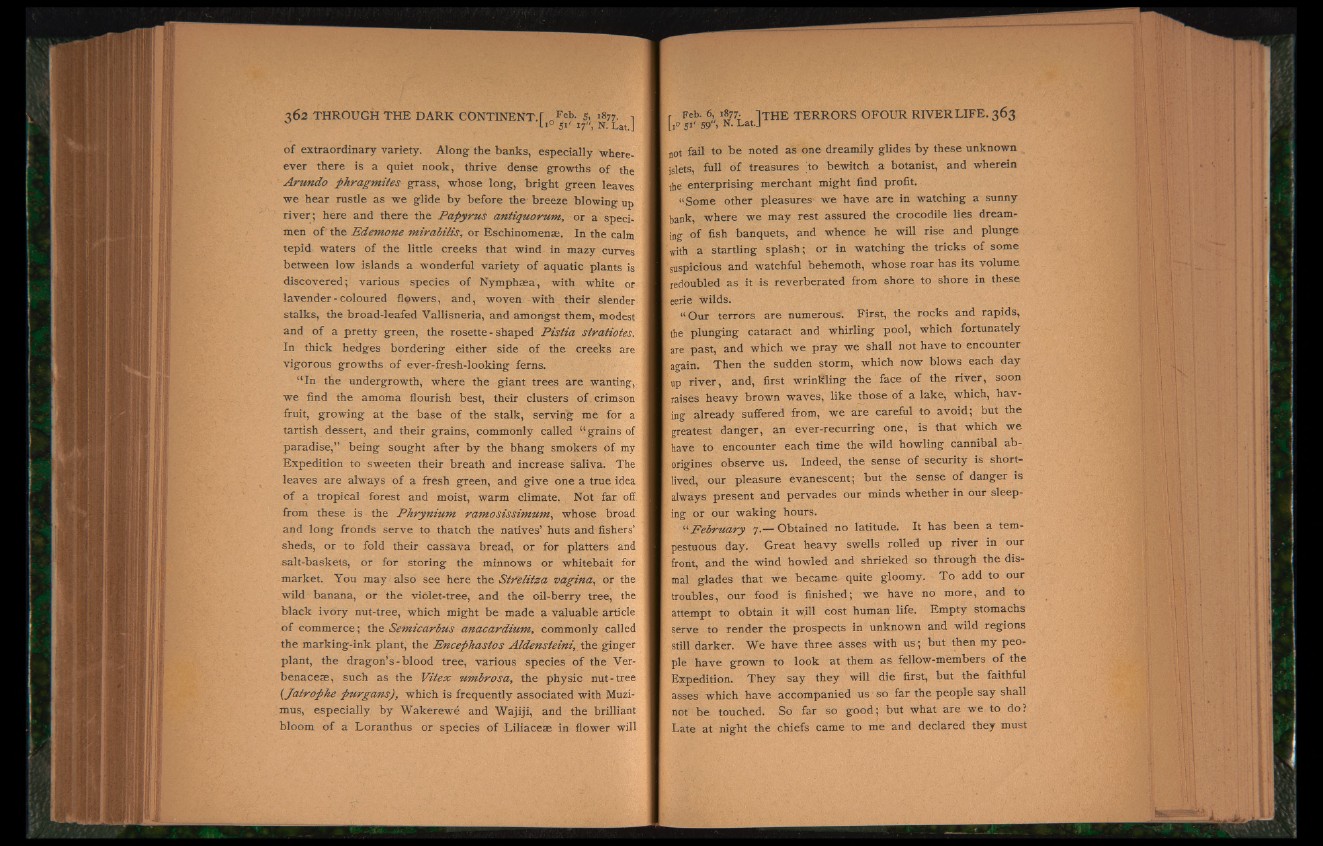
of extraordinary variety. Along the banks, especially where-
ever there is a quiet nook, thrive dense growths of the
Arundo phragmites grass, whose long, bright green leaves
we hear rustle as we glide by before the breeze blowing up
river; here and there the Papyrus antiquorum, or a specimen
of the Edemone mirabilis, or Eschinomenae. In the calm
tepid waters of the little creeks that wind in mazy curves
between low islands a wonderful variety of aquatic plants is
discovered; various species of Nymphasa, with white or
lavender - coloured flowers, and, woven with their slender
stalks, the broad-leafed Vallisneria, and amongst them, modest
and of a pretty green, the rosette - shaped Pistia stratiotes.
In thick hedges bordering either side of the creeks are
vigorous growths of ever-fresh-looking ferns.
“ In the undergrowth, where the giant trees are wanting,
we find the amoma flourish best, their clusters of, crimson
fruit, growing at the base of the stalk, serving me for a
tartish dessert, and their grains, commonly called “ grains of
paradise,” being sought after by the bhang smokers of my
Expedition to sweeten their breath and increase saliva. The
leaves are always of a fresh green, and give one a true idea
of a tropical forest and moist, warm climate. Not far off
from these is the Phrynium ramosissimum, whose broad
and long fronds serve to thatch the natives’ huts and fishers’
sheds, or to fold their cassava bread, or for platters and
salt-baskets, or for storing the minnows or whitebait for
market. You may also see here the Strelitza vagina, or the
wild banana, or the violet-tree, and the oil-berry tree, the
black ivory nut-tree, which might be made a valuable article
of commerce; the Semicarbus anacardium, commonly called
the marking-ink plant, the Encephastos Aldensteini, the ginger
plant, the dragon’s-blood tree, various species of the Ver-
benaceae, such as the Vitex umbrosa, the physic nut-tree
(Jatrophe purgans), which is frequently associated with Muzi-
mus, especially by Wakerewe and Wajiji, and the brilliant
bloom of a Loranthus or species of Liliaceae in flower will
, Feb. 6, 1877. -|th e t e r r o r s o fo u r r iv e r l i f e . 363
& Si' 59 > N- Lat-J
not fail to be noted as one dreamily glides by these unknown
islets, full of treasures 'to bewitch a botanist, and wherein
the enterprising merchant might find profit.
“Some other pleasures- we have are in watching a sunny
bank, where we may rest assured the crocodile lies dream-
; ing of fish banquets, and whence he will rise and plunge
twith a startling splash; or in watching the tricks of some
¡ suspicious and watchful behemoth, whose roar has its volume
i redoubled as it is reverberated from shore to shore in these
eerie wilds.
“ Our terrors are numerous'. First, the rocks and rapids,
the plunging cataract and whirling pool, which fortunately
are past, and which we pray we shall not have to encounter
¡ again. Then the sudden storm, which now blows each day
up river, and, first wrinkling the face of the river, soon
¡ raises heavy brown waves, like those of a lake, which, having
already suffered from, we are careful to avoid; but the
greatest danger, an ever-recurring one, is that which we
have to encounter each time the wild howling cannibal aborigines
observe us. Indeed, the sense of security is shortlived,
our pleasure evanescent; but the sense of danger is
always present and pervades our minds whether in our sleeping
or our waking hours.
“ February 7.— Obtained no latitude. It has been a tempestuous
day. Great heavy swells rolled up river in our
front, and the wind howled and shrieked so through the dismal
glades that we became, quite gloomy. To add to our
troubles, our food is finished; we have no more, and to
attempt to obtain it w.ill cost human life. Empty stomachs
serve to render the prospects in unknown and wild regions
still darker. We have three asses with us; but then my people
have grown to look at them as fellow-members of the
Expedition. They say they will die first, but the faithful
asses which have accompanied us-so far the people say shall
not be touched. So far so good; but what are we to do ?
Late at night the chiefs came to me and declared they must